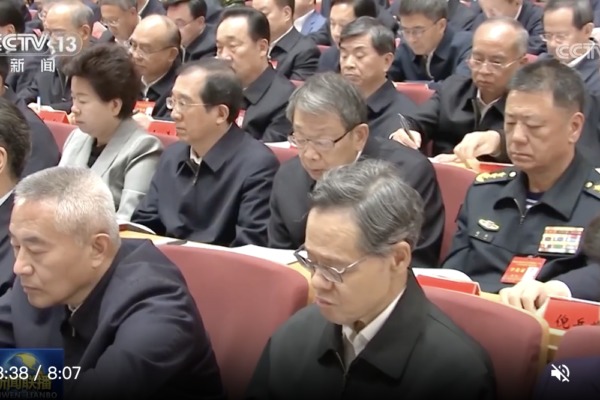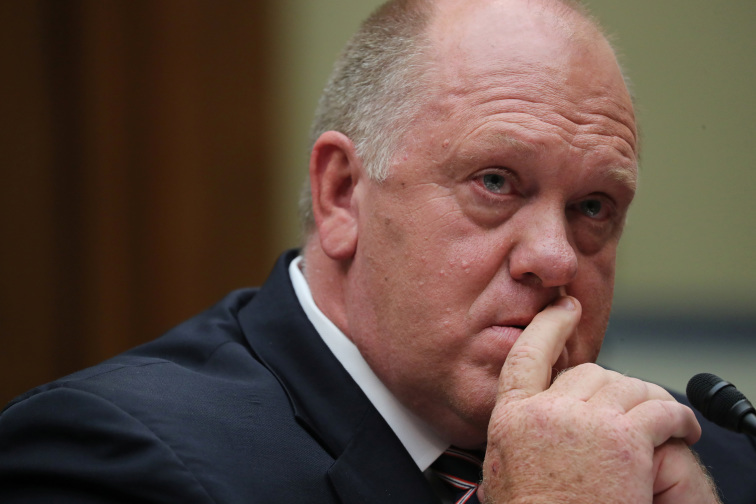The image shows representatives from the Chinese military attending the Two Sessions in Beijing. (Video screenshot)
[People News] On November 13, 2024, Dajiyuan published an article by Yang Ning titled “Former Defense Minister Liang Guanglie Dies of Illness: Two Reasons That Made His Life Difficult to Save.” The full text is as follows:
On November 12, Chinese state media reported the death of former Central Military Commission member, former State Councilor, and Minister of Defense Liang Guanglie, at the age of 84. The Chinese Communist Party (CCP) described him as an “outstanding leader in national defense and military work.”
Considering the superior healthcare system available to high-ranking CCP officials, Liang’s death at 84 could be considered premature. Last year, overseas Twitter sources cited leaks from within the CCP, claiming that the Central Health Commission, chaired by Ding Xuexiang, the head of the General Office and current Politburo Standing Committee member, received a central government allocation of 16.48 billion yuan for fewer than 1,000 top officials at the central and provincial levels in 2022. Liang Guanglie was likely included in this group. The funds are primarily spent on luxurious hospital rooms and comprehensive health and treatment services.
Additionally, in 2005, Beijing’s 301 Hospital launched the "Project 981," a health initiative for top CCP leaders aiming to extend their lifespans to 150 years, which includes organ transplants.
Huang Jiefu, former Minister of Health and chairman of the Organ Donation and Transplantation Committee, became head of the Central Health Bureau in July 2005, overseeing medical care for CCP leaders. His predecessor, Wu Jieping, a urological surgeon, performed China’s first kidney transplant in 1960. Since then, using live organ transplants to meet the health needs of high-ranking CCP officials has become standard practice.
A few years ago, on the internet appeared a “mysterious conversation between a National Security Committee core member and a certain second-generation red (elite).” In it, they mentioned that, after CCP rulers reach the top position, they have only two goals: one is to maintain permanent stability of the regime; the second is to figure out how to achieve immortality, how to live longer and with a higher quality of life. To extend their lifespan, they are willing to pay any price. They can replace kidneys, livers, hearts, and lungs—anything can be replaced. After replacing internal organs, they could even replace the brain. These massive costs, of course, are ultimately borne by the Chinese people.
As for Liang Guanglie, it is clear that even with such care, his illness had already become so severe that no medicine could help him, no organs could be replaced, and no doctor could save him; he had only to be taken away by the “black and white impermanence” (symbolic of death). According to Buddhism, all things are subject to cause and effect.
Firstly, as Jiang Zemin’s close associate, Liang Guanglie was involved when Jiang launched the crackdown on Falun Gong in July 1999 and issued the cruel order for live organ harvesting from Falun Gong practitioners. During Liang’s visit to the United States from May 4 to 10, 2012, he was asked in a phone investigation by the World Organization to Investigate the Persecution of Falun Gong and admitted that the Central Military Commission had discussed detaining Falun Gong practitioners and the military hospitals’ organ harvesting from them.
The World Organization to Investigate the Persecution of Falun Gong’s previous investigations indicate that the CCP military played a unique and crucial role in the crimes of organ harvesting from Falun Gong practitioners. The General Logistics Department used military systems and national resources to detain Falun Gong practitioners who petitioned in Beijing without providing their names and those illegally detained elsewhere, collecting blood samples and inputting them into a computer system. They used military vehicles, flights, special police units, military facilities, and wartime infrastructure as concentration camps for unified detention and management, creating a national living organ donor pool. Moreover, the General Logistics Department used various channels to allocate donors to military and some local hospitals. Their operation mode was to provide a donor directly to hospitals for cash (or foreign exchange), and hospitals paid the General Logistics Department directly, bearing their own profits and losses.
Recordings of Liang Guanglie and others indicate that top-level CCP leaders and Central Military Commission leaders were aware of these activities. Knowing this and not stopping it, or even assisting in the atrocities—can such grave crimes escape the eyes of heaven?
Secondly, Liang Guanglie and his family were severely corrupt.
As early as 2010, allegations appeared online accusing Liang Guanglie of selling military land at low prices for profit. Reports claimed that Liang’s two sons were typical troublemakers within military circles, using Liang’s influence to engage in the “business of selling positions.” During his tenure as Chief of Staff, Liang allegedly sold over 7,000 acres of military land, amassing billions in profits.
For instance, Liang reportedly ordered the sale of land designated for villas in "Beijing Yuxiangshan" (a military land area managed by the General Staff Department) to developers at a very low price. He even changed the land’s designation to residential, allowing the construction of commercial housing next to the residences of former Politburo Standing Committee members. Reports indicate that, at the time, Hu Jintao was infuriated by Liang’s actions but felt powerless, as Liang had the backing of Jiang Zemin.
After Xi Jinping assumed power in 2012, he launched an intense anti-corruption campaign. One of those implicated was former Deputy Head of the General Logistics Department, Gu Junshan, who had Liang Guanglie as one of his supporters. Liang’s name also appeared in the circles of Bo Xilai and Zhou Yongkang, who were plotting a coup.
Following the downfall of Xu Caihou, Liang was also investigated for an extended period. However, by voluntarily returning misappropriated assets and pledging not to interfere with the military, he temporarily avoided further consequences. Nevertheless, overseas reports in 2017 claimed that, amid further investigations into numerous high-ranking military officers, authorities found extensive issues involving Liang. Decisions on major military matters—such as officer promotions, rank assignments, position transfers, budget allocations, procurement, and land transfers—were reportedly made jointly by Liang, Guo Boxiong, and Xu Caihou, before being presented to Central Military Commission meetings for formal approval.
Additionally, detained financier Xiao Jianhua—owner of the "Tomorrow Group" and a “white glove” for high-level families like Zeng Qinghong’s—was said to have close ties with Liang Guanglie’s son, Liang Jun. Xiao may have already disclosed details of these connections.
In August 2018, Yang Hui, Deputy Commander and Chief of Staff of the Eastern Theater Command and former head of the General Staff Department’s Second Department, was dismissed. Public records and overseas media reveal that Yang was introduced to Jiang Zemin by Xiong Guangkai, who oversaw military intelligence and foreign affairs. From then on, Yang attached himself to Jiang, forming close ties with other Jiang confidants in the military, such as You Xigui, Jia Ting’an, and with Jiang’s close allies in the Central Military Commission, former Vice-Chairmen Guo Boxiong and Xu Caihou.
Later, through intermediaries, Yang connected with Liang Guanglie’s son, Liang Jun (or some say his nephew), and bribed him with two villas and several million yuan. In 2007, after Liang Guanglie was promoted to the Central Military Commission, he directly appointed Yang Hui as head of the General Staff Department’s Second Department (Intelligence), a decision even unknown to Chief of Staff Chen Bingde.
However, just over a year into his position, on November 17, 2008, Huang Guangyu, founder of Gome Electronics and then China’s richest man, was arrested. Yang Hui’s close associate, Liu Penghui, an independent non-executive director at Gome, fled abroad after receiving a tip-off from Zhou Yongkang’s secretary, Ji Wenlin. An investigation by China’s Ministry of State Security later found that Liu Penghui was affiliated with the CIA. This incident caused a major stir at the time.
Around August 2011, due to his connection to the Huang Guangyu case and Liu Penghui’s escape, Yang Hui was “promoted in name but demoted in reality,” transferred to the Nanjing Military Region as Chief of Staff. This transfer was achieved with the assistance of Liang Guanglie, who was then Minister of Defense, and Xu Caihou. Liang had deep roots in the Nanjing Military Region, which explains why, for a long time after Xi Jinping assumed power, Yang Hui did not pledge allegiance to Xi.
After Liang Guanglie’s complete retirement in 2013, rumors occasionally emerged about investigations into him. Following investigations into two defense ministers, Li Shangfu and Wei Fenghe, Liang’s repeated absences from public events led to speculation that he, too, might be under scrutiny.
Now, with news of Liang Guanglie’s death, it is likely that his previous absences were due to health reasons. This once again illustrates the principle of cause and effect—no evil deed escapes the watchful eyes of heaven.











News magazine bootstrap themes!
I like this themes, fast loading and look profesional
Thank you Carlos!
You're welcome!
Please support me with give positive rating!
Yes Sure!